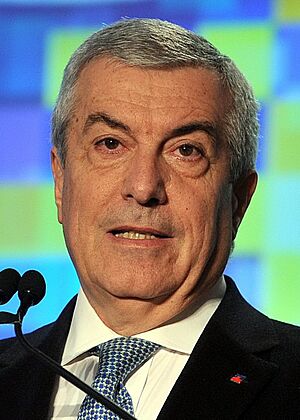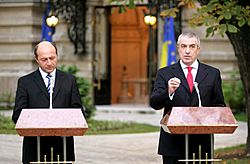Călin Popescu-Tăriceanu facts for kids
Quick facts for kids
Călin Popescu-Tăriceanu
|
|||||||||||||||||||||
|---|---|---|---|---|---|---|---|---|---|---|---|---|---|---|---|---|---|---|---|---|---|

Tăriceanu in 2014
|
|||||||||||||||||||||
| President of the Senate of Romania | |||||||||||||||||||||
| In office 10 March 2014 – 2 September 2019 |
|||||||||||||||||||||
| Preceded by | Crin Antonescu | ||||||||||||||||||||
| Succeeded by | Teodor Meleșcanu | ||||||||||||||||||||
| Prime Minister of Romania | |||||||||||||||||||||
| In office 29 December 2004 – 22 December 2008 |
|||||||||||||||||||||
| President | Traian Băsescu Nicolae Văcăroiu (Acting) Traian Băsescu |
||||||||||||||||||||
| Preceded by | Eugen Bejinariu (Acting) Adrian Năstase |
||||||||||||||||||||
| Succeeded by | Emil Boc | ||||||||||||||||||||
| Minister of Foreign Affairs | |||||||||||||||||||||
| Acting 21 March 2007 – 5 April 2007 |
|||||||||||||||||||||
| Prime Minister | Himself | ||||||||||||||||||||
| Preceded by | Mihai-Răzvan Ungureanu | ||||||||||||||||||||
| Succeeded by | Adrian Cioroianu | ||||||||||||||||||||
| Minister of Industry and Commerce | |||||||||||||||||||||
| In office 12 December 1996 – 5 December 1997 |
|||||||||||||||||||||
| Prime Minister | Victor Ciorbea | ||||||||||||||||||||
| Preceded by | Alexandru Stănescu | ||||||||||||||||||||
| Succeeded by | Mircea Ciumara | ||||||||||||||||||||
| Founding Leader of the Alliance of Liberals and Democrats | |||||||||||||||||||||
| In office 19 June 2015 – 19 October 2020 Serving with Daniel Constantin (until April 2017)
|
|||||||||||||||||||||
| Preceded by | Himself (as president of the Liberal Reformist Party) Daniel Constantin (as president of the Conservative Party) |
||||||||||||||||||||
| Succeeded by | Daniel Olteanu | ||||||||||||||||||||
| Leader of the National Liberal Party | |||||||||||||||||||||
| In office 2 October 2004 – 20 March 2009 |
|||||||||||||||||||||
| Preceded by | Theodor Stolojan | ||||||||||||||||||||
| Succeeded by | Crin Antonescu | ||||||||||||||||||||
| Founding Leader of the Liberal Reformist Party | |||||||||||||||||||||
| In office 3 July 2014 – 19 June 2015 |
|||||||||||||||||||||
| Succeeded by | Himself & Daniel Constantin (party merged with the Conservative Party into the Alliance of Liberals and Democrats) | ||||||||||||||||||||
|
|||||||||||||||||||||
| Personal details | |||||||||||||||||||||
| Born |
Călin Constantin Anton Popescu-Tăriceanu
14 January 1952 Bucharest, Romania |
||||||||||||||||||||
| Political party | Romanian Communist Party (before 1990) National Liberal Party (1990) National Liberal Party - Youth Wing (1990–1993) Liberal Party '93 (1993–1998) National Liberal Party (1998–2014) Liberal Reformist Party (2014–2015) Alliance of Liberals and Democrats (2015–2020) PRO Romania (2020–2021) |
||||||||||||||||||||
| Other political affiliations |
Alliance of Liberals and Democrats for Europe Party (2004–2009; 2015–2019) | ||||||||||||||||||||
| Spouses | Cornelia Tăriceanu (Divorced) Livia Tăriceanu (Divorced) Ioana Tăriceanu (Divorced) Loredana Moise |
||||||||||||||||||||
| Children | 2 | ||||||||||||||||||||
| Alma mater | Technical University of Civil Engineering | ||||||||||||||||||||
| Signature |  |
||||||||||||||||||||
Călin Popescu-Tăriceanu (born 14 January 1952) is a Romanian politician. He served as the Prime Minister of Romania from 2004 to 2008. The Prime Minister is the head of the government in Romania.
He was also the president of the National Liberal Party (PNL). Later, he became the President of the Senate, which is the second most important position in the Romanian government. He held this role from 2014 to 2019. In 2014, he started a new political group called the Liberal Reformist Party (PLR). This party later joined with another to form the Alliance of Liberals and Democrats (ALDE).
Contents
About Călin Popescu-Tăriceanu's Early Life
Călin Popescu-Tăriceanu was born in Bucharest, the capital city of Romania. He has two children. He studied at the Technical University of Civil Engineering of Bucharest. He also earned a master's degree in Mathematics and Computer Science.
Beginning His Political Journey
Between 1996 and 1997, he worked as the Minister of Industries and Commerce. This role involved managing businesses and trade for the country. From 1996 to 2004, he was a member of the Chamber of Deputies. This is one of the two parts of Romania's Parliament, where laws are made.
From 2000 to 2004, he was a vice president for his party's group in Parliament. He also served as a vice president on the Budget, Finances, and Insurance Committee. This committee deals with how the government spends money.
Leading Romania as Prime Minister (2004–2008)

After Traian Băsescu won the presidential election in 2004, he chose Tăriceanu to be the Prime Minister. This was part of an agreement between their political parties. The new government officially started on 29 December 2004. Parliament approved the government with a vote of 265 for and 200 against. He was the first National Liberal Prime Minister of Romania since 1937.
Key Changes During His Time as Prime Minister
During Tăriceanu's time as Prime Minister, several important changes happened. These included:
- Introducing a flat tax, which means everyone pays the same percentage of their income in taxes.
- Changing the value of the Romanian currency, the leu.
- Ending conscription, which meant young people no longer had to join the military by force. The Romanian Armed Forces became a professional army.
- Romania joining the European Union in 2007.
His time as Prime Minister also saw a period of strong economic growth in Romania.
Challenges and Decisions as Prime Minister
On 7 July 2005, Tăriceanu announced that he and his government would resign. This was to try and have early elections. However, he later changed his mind on 19 July. He decided not to resign because severe floods were affecting the country. These floods caused many problems and left thousands of people without homes.
After this, the relationship between Prime Minister Tăriceanu and President Băsescu became difficult. They often disagreed on important issues.
In 2006, Tăriceanu announced that his party supported taking Romanian troops out of international conflict areas. This mainly referred to Romanian troops in Iraq. President Băsescu strongly disagreed with this idea.
In 2007, Tăriceanu temporarily took on the role of Minister of Foreign Affairs. This happened after the previous minister resigned and President Băsescu did not immediately approve a new person for the job.
Later Political Roles
On 26 February 2014, Tăriceanu left the National Liberal Party (PNL). He then announced he would start a new political party called the Liberal Reformist Party (PLR). He was elected as the president of this new party.
Soon after, on 10 March 2014, Tăriceanu was elected as the new President of the Senate. He held this important position as an independent senator.
Presidential Candidacy and Party Merger
In July 2014, Tăriceanu announced he would run for president in the 2014 presidential elections. Because his new party was not officially registered in time, he ran as an independent candidate. He finished third in the first round of the election.
In July 2015, his party, the PLR, merged with another party called the Conservative Party (PC). Together, they formed a new party named the Alliance of Liberals and Democrats (ALDE). Tăriceanu became a co-president of this new party.
Electoral History
Presidential Elections
| Election | Affiliation | First round | Second round | ||||
|---|---|---|---|---|---|---|---|
| Votes | Percentage | Position | Votes | Percentage | Position | ||
| 2014 | Independent1 | 508,572 |
5.36%
|
3rd | Not qualified | ||
Notes:
1 His party, PLR, did not manage to register in time for the elections, so he ran as an independent.
Mayor of Bucharest
| Election | Affiliation | First round | ||
|---|---|---|---|---|
| Votes | Percentage | Position | ||
| 2020 | ALDE | 9,892 |
1.49%
|
5th |
See also
 In Spanish: Călin Popescu-Tăriceanu para niños
In Spanish: Călin Popescu-Tăriceanu para niños

